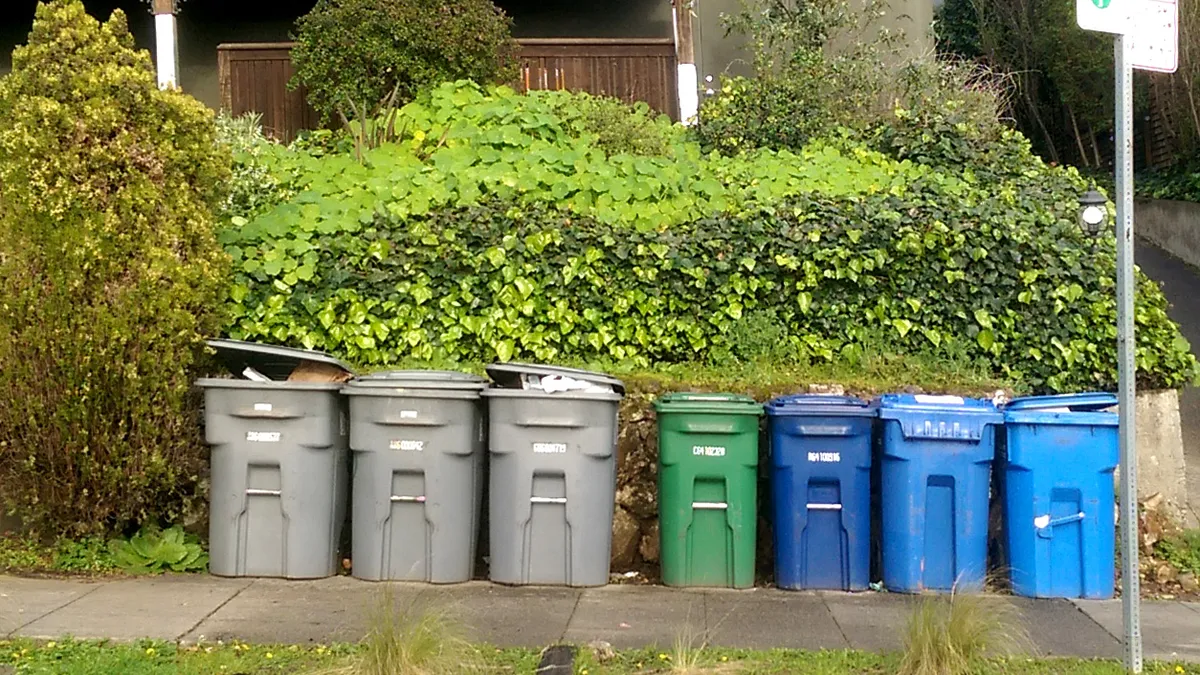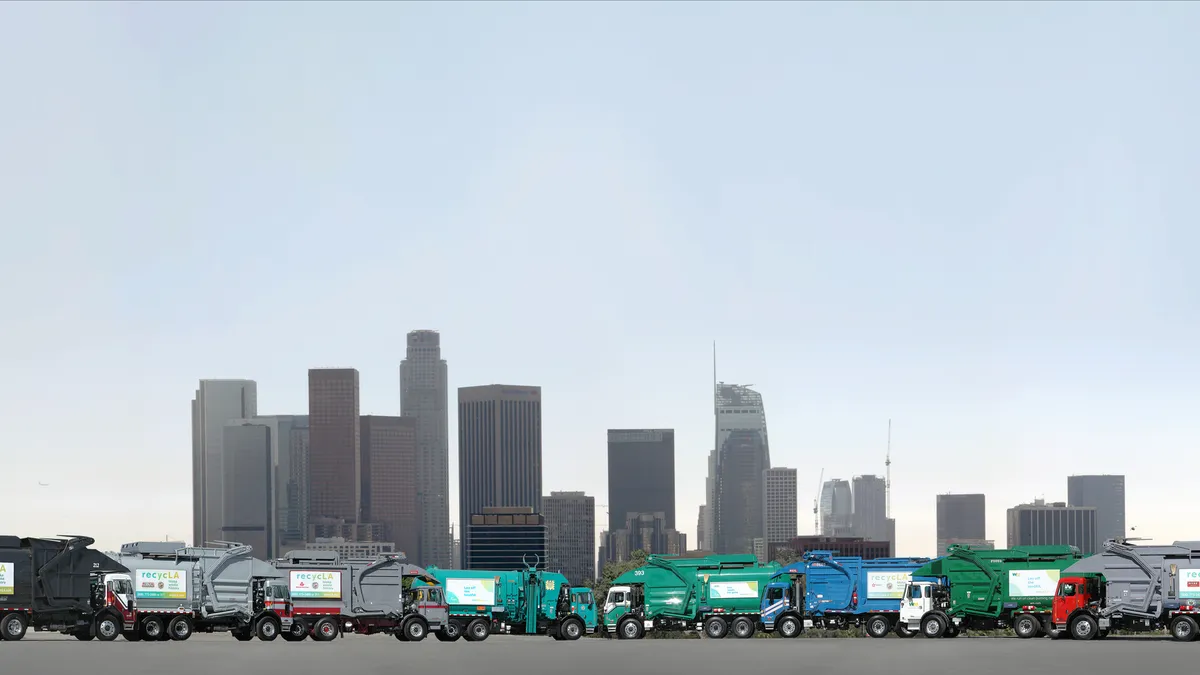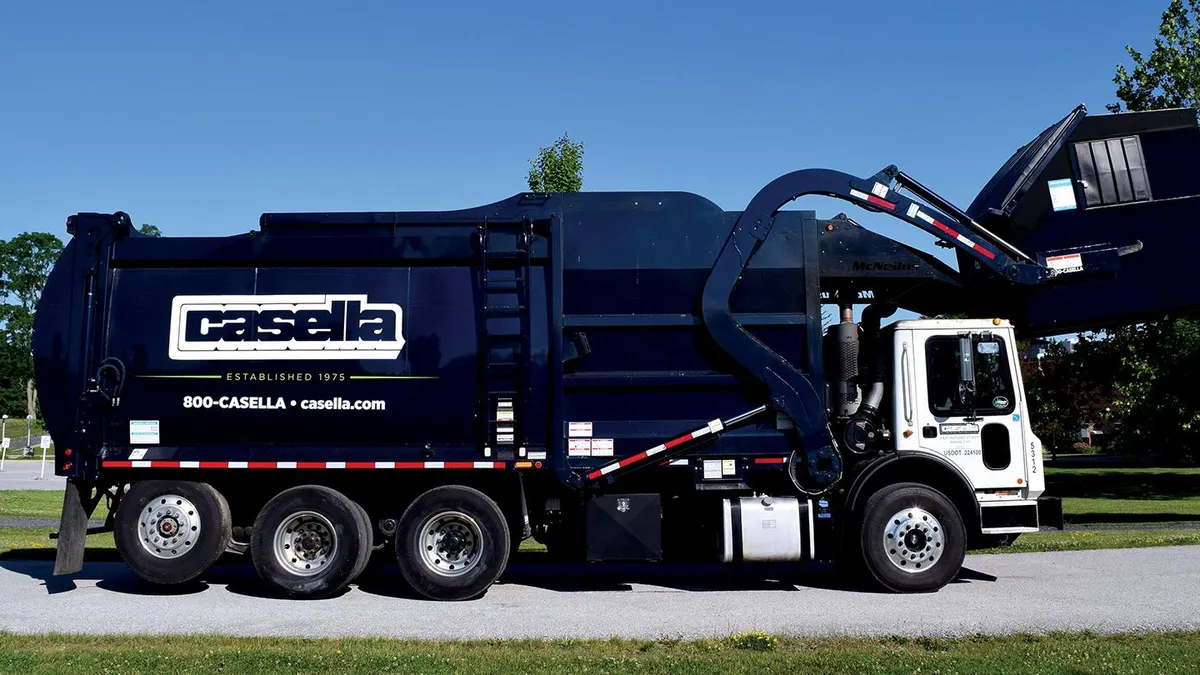Organics: Page 33
-
Study: Increase packaging, reduce food waste
Ameripen found countries which have more packaged food tend to waste less food than countries with less packaging.
By Cody Boteler • Jan. 24, 2018 -
ReFED: Tackling food waste is an $18.2B opportunity for retailers
A new "action guide" makes the case that the cost of wasted food is more than double the profit potential from the original product and outlines ways to significantly boost recovery efforts.
By Cole Rosengren • Jan. 24, 2018 -
Portland, OR taps Waste Management to process food scraps
The regional government is not releasing details of the negotiations, however, until it files a notice of intent to award the processing contract.
By Cody Boteler • Jan. 16, 2018 -
Redevelopment plans for Hartford, CT facility call for both WTE and AD
Hartford's mayor, however, is promising further negotiations for more environmental protections or higher payments from the facility.
By Cody Boteler • Jan. 4, 2018 -
Twin Cities, MN region struggles with organics capacity
Organic waste in the region mainly goes to two composting facilities, both of which are nearing capacity — and regulations and other difficulties may complicate efforts to expand capabilities.
By Cody Boteler • Jan. 3, 2018 -
Deep Dive
16 industry conferences to mark on your 2018 calendar
As the new year kicks off, it's as good a time as any to start looking for educational and networking opportunities.
By Cody Boteler • Jan. 2, 2018 -
Interest in organics diversion grows in Iowa following new study
About 20% of the material going to Scott County's landfill is food — similar to the statewide average — but that could soon change.
By Cole Rosengren • Dec. 21, 2017 -
Madison, Wisconsin suspends curbside organics pilot after 7 years
High contamination, low participation and limited processing options derailed the program, though city officials still hope to revive it in some form.
By Cole Rosengren , Cody Boteler • Updated June 12, 2018 -

 Retrieved from Wikimedia Commons.
Retrieved from Wikimedia Commons.
Survey: 5.1M residents have access to curbside organics collection
Data from BioCycle and the Institute for Local Self-Reliance show big increases in curbside and drop-off programs as food waste awareness spreads.
By Cole Rosengren • Dec. 15, 2017 -
Organics customers, recovery and projected capacity all growing in Massachusetts
A new Department of Environmental Protection analysis estimates organics collection customers have increased 56% since 2014 and 260,000 tons of material were diverted last year.
By Cole Rosengren • Dec. 14, 2017 -
New app goMkt will connect consumers with excess food in NYC
The program is starting as a business-to-consumer platform, but founder Matt Holtzman has his eyes on another platform: Business-to-business.
By Cody Boteler • Dec. 13, 2017 -
Waste Management taps Anaergia for organics pre-processing and AD in latest recycLA investment
While the company has one of its own CORe pre-processing systems in the area, Anaergia's OREX system is said to be a complementary and potentially more powerful approach.
By Cole Rosengren • Dec. 12, 2017 -
4 companies to submit proposals for new Santa Rosa, CA composting operation
The city has yet to release details on the size of the new operation, but up to 26 acres of city-owned property may be leased for the project, according to city officials.
By Cody Boteler • Dec. 12, 2017 -
Opinion
How waste audits can help cities and businesses
There's a push to solve the problem of food waste right now, but that can't be the only focus to hit "zero waste" goals.
By Ushma Pandya Mehta • Dec. 8, 2017 -
UK grocery chain to sell food past 'best by' date to cut waste
For one month after non-perishable food items hit their "best by" date, The East of England Co-Op will sell food at a steep mark down to reduce waste.
By Cody Boteler • Dec. 5, 2017 -
Dive Awards
Sanitation Department of the Year: LASAN
This year, the Los Angeles Department of Sanitation launched the largest commercial waste franchise system in the country.
By Cole Rosengren • Dec. 4, 2017 -
LASAN addresses franchise growing pains during tense public meeting
The ambitious recycLA transition timeframe has included missed collections, sticker shock, a nascent ballot initiative and also success stories.
By Cole Rosengren • Dec. 4, 2017 -
UK agencies release new 'little blue fridge' label to cut food spoilage
A new government-backed date labeling system could be a model for similar reform efforts in the U.S. to eliminate customer confusion and resulting food waste.
By Cole Rosengren • Dec. 1, 2017 -
Scott Pruitt's favorite piece of Disney magic: Florida park's anaerobic digester
The EPA Administrator visited the Magic Kingdom to highlight a Harvest Power facility that processes around 120,000 tons of food waste annually.
By Cody Boteler • Nov. 30, 2017 -
Hard to swallow: 6M turkeys were trashed last year
The NRDC is promoting a new "Guest-imator" meal planning tool to ensure food waste doesn't gobble up space in landfills.
By Cody Boteler • Nov. 22, 2017 -
Deep Dive
Colleges combat food waste through innovation, dedicated buy-in
Colleges and universities waste more than 20 million pounds of food each year. Initiatives to reduce food waste could be a benefit to campuses and surrounding communities.
By Pat Donachie • Nov. 21, 2017 -
Customers are paying Casella's rising costs to deal with new recycling specifications
The Northeastern company reported a $700,000 labor increase for Q3 to keep up with market demands, but said China's contamination standards "are not going to be met by anyone."
By Cole Rosengren • Nov. 3, 2017 -
6 trade associations ask DSNY to withdraw new commercial organics rule
Recycling and food industry groups raised questions about regional processing capacity. DSNY says this is an important next step toward "zero waste" by 2030.
By Cole Rosengren • Nov. 2, 2017 -
NRDC Report: Majority of waste food in city households is edible
Produce and leftovers were the most commonly wasted items following intensive research in New York, Denver and Nashville, TN.
By Cole Rosengren • Oct. 25, 2017 -
Q&A
LASAN Director Zaldivar on franchising, food waste and the future of collection vehicles
Amid recycLA growing pains, Enrique Zaldivar told Waste Dive that LASAN's newly increased control over the waste stream provides further insulation from market whims.
By Cole Rosengren • Oct. 23, 2017



